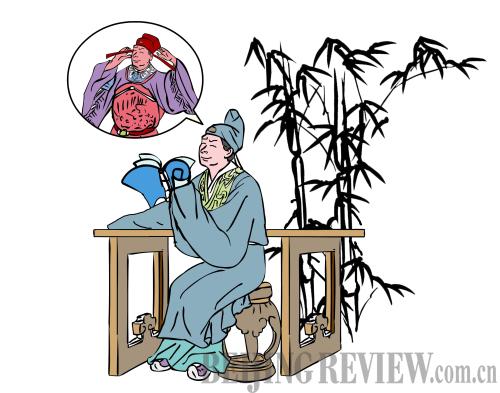|
 |
|
(LI SHIGONG) |
"Chinese mythology has many gods and spirits. One of the most enduring and popular of these gods is called Ho-Po or Ho-Shen, the Spirit of the River. Chinese ancients perceived him as a greedy god, because he often took a fancy to mortal men's most beautiful daughters. It is said that he abducted them to put in his harem under the water," said Mr. Yang, my teacher and friend.
"China is certainly known for its long and beautiful rivers," I remarked. "Especially the Yellow River, but I knew nothing about river gods."
"We have many water spirits and gods. There is an ancient legend about a governor who served in Hubei Province. It was said that the Yellow River was rising and going to overflow its banks, so the people first threw in a white horse as a sacrifice to calm the river god. The water continued to rise. Then the governor filled the gap in the embankment with his own body to stop the river. At the very last minute, the water began to recede. In this way the people were saved and all knew that the governor was a just man," said Teacher Yang.
"Wow, that's pretty dramatic," I said.
"This legend demonstrates the way nature and powerful rulers are interconnected. That is why ancient Chinese emperors always made sacrifices during harvests, to show their respect for natural forces," teacher Yang explained.
"Are there other river spirit legends?" I asked.
"Of course," said Teacher Yang. "In 320, a young man in Hangzhou was walking home in the dark. It was late at night. Suddenly, a boy called to him in the darkness, saying: 'My master wants to see you.' The young man got into the carriage and they rode a long way until they reached a pathway lit by torches. Passing these lights, the carriage entered an emerald green walled city; on the walls the young man saw the words: Abode of the River God."
"And then what happened?" I asked.
"The young man met the river god, who told him he was chosen to marry the god's daughter. The young man could not refuse. The bride was beautiful, studious, and only eighteen," said Teacher Yang.
"Sounds great; so they lived happily ever after?" I asked.
"No," replied Teacher Yang. "After four days the bridegroom was told he would be escorted back to the regular world to make his name as a physician. He was supposed to return to the river god's palace just once a year, to see his wife.
"Of course, as he was leaving, she cried and gave him gifts, including recipes for medicine. He returned to the normal world and became a very famous doctor, but his older brother suddenly died and because of various obligations he could not return to the spirit world and to his wife. Instead, he became a high ranking civil servant."
"These stories seem to promote China's civil service rather than the spirits," I remarked.
"Correct," said Teacher Yang. "In China, a long tradition, stemming from Confucian ideals, places loyalty to family and to the state far ahead of personal satisfaction."
"How did the ancient Chinese state locate good civil servants?" I asked my friend.
"That is a very pertinent question," Teacher Yang said. "Traditionally, the very best people were found through examinations, which were held all over the country at certain times. Of those who took the exam, the crème de la crème were invited to the capital, where the emperor himself would test them. These outstanding individuals would be given high positions in the government. Sometimes the emperor would even give them a concubine or a daughter."
"Chinese people highly respect tests," I said.
"Yes," said Teacher Yang. "China is a country with many people, living on a vast area. In order to find the best, the most talented, testing is crucial—it's the civilized way to determine who would be the best candidate for any given job. This is why so many of your students are eager to pass TOEFL and SAT exams. They relish these tests as ways to pass through difficult academic gates, to show that they can excel."
"This is one of the big educational differences between Western and Chinese educational systems," I said. "Some American educators, for example, are seeking creative alternatives to standardized tests, because students are all different. Standardized tests may have cultural biases that leave students from some groups at a disadvantage."
"That may be true," said Mr. Yang. "But in China the population is more uniform and the cultural norms are ancient and more constant than in the U.S. So now why don't I test your vocabulary with a short grammar exercise? Shall we begin...."
The author is an American living in Beijing
Email us at: dingwenlei@bjreview.com | 